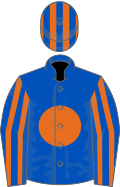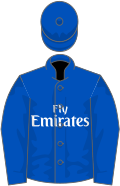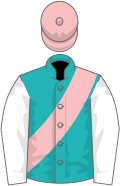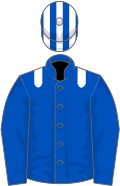Top Qs
Timeline
Chat
Perspective
Goodwood Cup
Flat horse race in Britain From Wikipedia, the free encyclopedia
Remove ads
The Goodwood Cup is a Group 1 flat horse race in Great Britain open to horses aged three years or older. It is run at Goodwood over a distance of 2 miles (3,219 metres), and it is scheduled to take place each year in late July or early August.
| 2025 | ||
 |
 |
 |
| Scandinavia | Illinois | Sweet William |
Remove ads
History
Summarize
Perspective
The first version of the Goodwood Cup was established in 1808, and it was won on three separate occasions by Bucephalus. Its trophy, a silver cup, was awarded permanently to the horse's owner after the third victory. The replacement trophy was a gold cup, and the inaugural running for this took place in 1812. The race was originally contested over 3 miles, but it was later cut to 2 miles and 5 furlongs. Since 1991 the race has been run over 2 miles.
A number of foreign-bred horses won the Goodwood Cup in the mid-19th century. Early winners for France included Jouvence, Monarque and Flageolet, and the United States was represented by Starke. A notable overseas victory came from Kincsem, a Hungarian filly undefeated in a career of fifty-four races.
The present system of race grading was introduced in 1971, and the Goodwood Cup was initially classed at Group 2 level. It was relegated to Group 3 status in 1985. It was shortened by a furlong in 1990, and reduced to its current length the following year. It regained Group 2 status in 1995. In 2017 the status was raised again to Group 1 and the purse was increased from £300,000 to £500,000.[1]
The Goodwood Cup is one of Britain's leading events for stayers – horses that specialise in racing over long distances. It is the second leg of the Stayers' Triple Crown, preceded by the Gold Cup and followed by the Doncaster Cup.
The race is now held on the opening day of the five-day Glorious Goodwood meeting.
Remove ads
Records
Most successful horse (4 wins):
- Stradivarius – 2017, 2018, 2019, 2020
Leading jockey (5 wins):
- Jem Robinson – Fleur de Lis (1829), Glencoe (1834), Rockingham (1835), Beggarman (1840), Charles the Twelfth (1842)
- George Fordham – Baroncino (1855), Rogerthorpe (1856), Starke (1861), The Duke (1866), Border Minstrel (1883)
- Steve Donoghue – Queen's Square (1919), Mount Royal (1920), Bucks (1921), Cloudbank (1925), Brown Jack (1930)
- Lester Piggott – Gladness (1958), Exar (1960), Proverb (1974), Girandole (1975), Ardross (1981)
- Pat Eddery – Erimo Hawk (1972), Valuable Witness (1985), Mazzacano (1989), Sonus (1993), Grey Shot (1996)
- Frankie Dettori – Kayf Tara (1999), Schiaparelli (2009), Opinion Poll (2011), Stradivarius (2019, 2020)
Leading trainer (7 wins):
- John Scott – Hornsea (1836), Carew (1837), Charles the Twelfth (1841, 1842), Canezou (1849, 1850), Sweetsauce (1860)
Remove ads
Winners since 1849
The race was not run from 1915 to 1918 because of World War I and from 1940 to 1945 because of World War II
‡ denotes a winning filly or mare
Remove ads
Earlier winners
- 1812: Shoestrings
- 1813: Camerton
- 1814: Banquo
- 1815: no race
- 1816: Scarecrow
- 1817–24: no race
- 1825: Cricketer
- 1826: Stumps
- 1827: Link Boy
- 1828: Miss Craven
- 1829: Fleur de Lis
- 1830: Fleur de Lis
- 1831: Priam
- 1832: Priam
- 1833: Rubini
- 1834: Glencoe
- 1835: Rockingham
- 1836: Hornsea
- 1837: Carew
- 1838: Harkaway
- 1839: Harkaway
- 1840: Beggarman
- 1841: Charles the Twelfth
- 1842: Charles the Twelfth
- 1843: Hyllus
- 1844: Alice Hawthorn
- 1845: Miss Elis
- 1846: Grimston
- 1847: The Hero
- 1848: Van Tromp
Remove ads
See also
References
External links
Wikiwand - on
Seamless Wikipedia browsing. On steroids.
Remove ads















































































































































